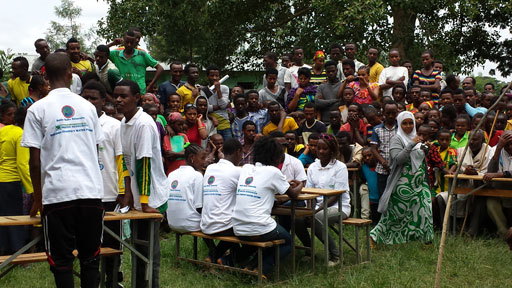4.3.1 Identifying key stakeholders
Representation from all the stakeholders is a priority in a multi-stakeholder WASH engagement project. Some less obvious stakeholders may be excluded from the usual decision-making processes; this should be avoided.
You have already come across a situation where some stakeholders were excluded from the decision-making process because they were not obvious. Look back to Section 4.1 and see if you can find it.
In Section 4.1 you read about community water supply points that may be accessed by people from adjacent villages who had not been considered during initial planning.
Local institutions such as schools, health centres, mosques and churches are considered important stakeholders. These are important strategic institutionsfor promoting community-based WASH interventions. While at school, children gain knowledge that influences them and informs their attitude and practice. In addition school children, via their teachers and WASH clubs, can educate their families and relatives when they return home. By this route, they can serve as agents of change to their communities. For example, Figure 4.4 shows a school WASH club performing a drama about handwashing for their relatives. (You will learn more about the role of schools in mobilising urban communities in Study Session 11.)

How might establishing WASH clubs in schools help in promoting improved hygiene in the wider community?
School children may learn at WASH clubs about washing their hands thoroughly after using the latrine. This could potentially lead to improved hygiene practices in the wider community if they tell their families what they have learned at school.
It is important to identify all stakeholders from the community including women, children and marginalised people. Marginalised people are those on the edges (margins) of society who are treated as insignificant or not important. There may be people in your community who find it difficult to come to meetings, for example because of their work pattern or because they have a disability. It is particularly important to ensure that such groups have a voice and are listened to. Excluding less obvious stakeholders from the usual decision-making processes is an easy mistake to make and may have serious social or economic costs. It can lead to unsustainable projects and no overall improvement in conditions.
A systematic approach to defining and identifying all relevant stakeholders during early planning stages is therefore essential for ensuring the effectiveness and sustainability of urban WASH initiatives.
4.3 Identifying and mapping local stakeholders
